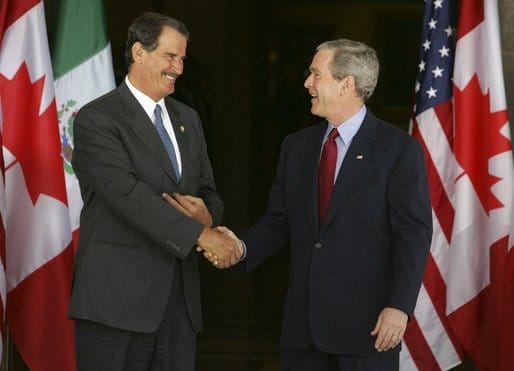Aubrey McClendon, former CEO of hydraulic fracturing (“fracking”) giant Chesapeake Energy and current CEO of American Energy Partners (AEP), has signed a joint venture with a private equity firm led* by former Mexico president Vicente Fox.*
In a joint press release, AEP and EIM (Energy and Infrastructure Mexico) Capital announced a “long-term, landmark partnership to explore the vast exploration and development opportunities offered by Mexico’s abundant oil and gas energy resources.” The deal serves as another case study of U.S.-based companies cashing in on the Mexico energy sector privatization policy the U.S. State Department helped make possible under both the Obama Administration and the Bush Administration.
EIM Capital was “founded in anticipation of Mexico’s historic Constitutional Reform of 2013,” according to its website.
“This is a significant vote of confidence in the Energy Reform program championed by current Mexican President Enrique Pena Nieto, and in the myriad possibilities offered by Mexico’s unconventional resources,” hailed the press release. Among those resources: Mexico’s side of the Eagle Ford Shale basin.
McClendon, one of the main characters featured in the book “The Frackers,” also recently announced AEP‘s entrance into Australia.
A State Department diplomatic cable published by Wikileaks shows that Fox, president of Mexico from 2000-2006, helped pave the way for the constitutional amendments passed in December 2013, which resulted in the privatization of Mexico’s energy sector. The amendments opened up the country for international companies to sign joint ventures with state-owned oil company Petróleos Mexicanos (PEMEX).
And Fox, like others in the U.S., has since passed through the government-industry revolving door to profit from the policy apparatus he made possible.
The Fox Cable
An October 3, 2005 State Department diplomatic cable about Fox’s first visit to Alberta, Canada stated that Fox introduced a “plan for expanding the organization’s role, including a new provision for energy.”
“[T]he Mexican Trade Consul in Calgary…[said] there continues to be much interest in investing in Mexico’s energy sector,” reads the cable. “The Trade Consul said it is ‘painful’ to let Mexico’s resources sit in the ground.”
Eventually that “pain” receded, with Mexico’s energy sector totally revamped in the decade that would follow. Fox reacted to the EIM–AEP deal with elation.
“This is a major opportunity for Mexican energy production,” Fox said in the press release. “We look forward to working closely with the Mexican government to advance this monumental project and enhance Mexico’s current energy policy.”
Royalty Ripoff?
One of the promising aspects of Mexico’s energy sector privatization package — from the vantage point of the oil and gas industry and capital investment firms — is the lower amount of royalty payments due to landowners, as compared to in the U.S.
Fox spoke of “Mexico’s cheaper labor costs and the government’s willingness to accept less royalties than U.S. landowners would make drilling cheaper in Mexico than in Texas,” in an October 2014 Dallas Morning News article. “The details are still being finalized, but EIM executives said the government would accept a sliding scale on royalties between 11.5 percent and 15 percent, depending on the price of oil.”
Shale gas producers in particular, such as McClendon’s AEP, will benefit from a discount handed to them in Mexico as a result of the constitutional amendments. The logic behind the discount, explained the Brookings Institution, is due to higher capital investment costs associated with fracking.
Chesapeake Energy is currently mired in a class-action lawsuit in Texas for allegedly short-changing landowners on royalty payments. And Jefferson County, Ohio landowners sued AEP subsidiary American Energy-Utica in June in another class-action lawsuit filed by 50 landowners, alleging much the same.
Mexico may be the perfect frontier for McClendon, who has made a career out of “land grab” as a business plan and preferring to make money by flipping over land.
Perhaps it’s only appropriate, then, that McClendon has crossed the border despite the fact it remains unclear when bidding will actually take place for shale drilling in Mexico, which according to the country’s energy secretary Joaquin Coldwell has been “suspended…pending a future evaluation.”
*Correction: This post originally stated that EIM was “owned by” Vicente Fox. President Fox serves on the board of directors of EIM and leads the firm along with its CEO, but Fox does not own it. We regret the error.
Photo Credit: Wikimedia Commons
Subscribe to our newsletter
Stay up to date with DeSmog news and alerts







